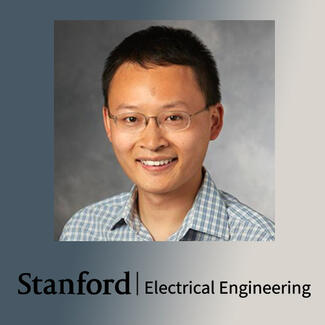
James Zou wins Overton Prize
The prize is awarded for outstanding accomplishment to a scientist in the early to mid-career stage who has already made a significant contribution to the field of computational biology.
Professor James Zou has been awarded the Overton Prize by the International Society of Computational Biology (ISCB).
By Laurie Notaro, Department of Biomedical Data Science Communications. Original article.
For James Zou, Associate Professor in the Department of Biomedical Data Science (DBDS), being named as the awardee of the Overton Prize is nothing short of dreamlike.
“It’s surreal to follow the footsteps of my intellectual heroes in receiving the Overton Prize,” Zou said.
The annual prize, awarded by the International Society of Computational Biology (ISCB), recognizes the research, education, and service accomplishments of early to mid-career scientists who are emerging leaders in computational biology and bioinformatics, according to ICSB. Those honored with the award have contributed significant advances to the field of computational biology in research, education, service, or a combination of all three considering their body of work.
Zou, who joined DBDS in 2016, is a prolific researcher who focuses on improving the foundations of machine learning and AI by making them more reliable and conducts in-depth scientific and clinical applications that are human compatible and statistically rigorous. Within his almost-decade at DBDS, a common theme across many of his works is combining new methods with emerging data types to advance precision medicine.
As a student, he was drawn to computational biology because of the possibilities that existing in the field, both at the current time, but also what it could mean for future research.
“The intersection of AI with biology and medicine is so tremendously fun, interesting and impactful,” he said. “We have many cutting-edge experimental and computational technologies, new data modalities, some of the deepest intellectual questions, and a real opportunity to benefit society. What could be better?”
At DBDS, Zou collaborated with Genentech on a multi-year project to understand which cancer patients respond best to specific treatments, which was recognized for a Top Ten Clinical Achievement Award.
“We integrated genomic profiling and EHR data of tens of thousands of patients to discover hundreds of predictive mutations–meaning if a patient has a particular mutation, they may respond well to treatment A but not treatment B,” he explained. “Along the way, we also created Trial Pathfinder, an algorithm for making cancer clinical trials more effective and inclusive.”
Zou is also excited by work he is conducting on AI for special biology, in which he and his lab studies RNA and protein expression of cells in their spatial environment. “We developed deep learning models to capture the geometry of cells that strongly predict response to various medicine,” he added. “We also showed how to ‘read out’ a cell’s genomics directly from its image.”
With AI at the center of his work, Zou has seen a shift in the field from AI as a tool to AI as a research partner in the last decade. When he joined the DBDS faculty, Zou said, AI was a tool for solving specific tasks that typically involved making predictions. When he and fellow researchers wanted to predict what the impact of a mutation was, they would train an AI model to do that. But in the last three years, the advances in AI have been vast, especially in large language models (LLM), and are transforming medicine because AI can now do much more than making specific predictions.
“For example, we recently developed the Virtual Lab, where an AI professor agent works with AI student agents to create new therapeutics like nanobodies,” Zou explained. “These agents, powered by LLMs, have their own group meetings to generate and execute their own research ideas. They make decisions and designs that are different from that of human researchers. I’m extremely excited about further developing these AI scientists.”
Zou is also the recipient of numerous honors and awards, including NSF CAREER Award, Google Faculty Award, Sloan Research Fellowship, and was named twice as a Chan-Zuckerberg Investigator.
“This honor also belongs to my truly amazing students, collaborators, mentors and colleagues, who make every day of research so fun and inspiring!” he concluded.
—Laurie Notaro, DBDS Communications